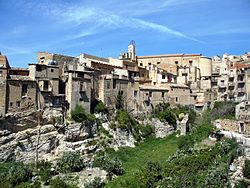Burgio
Burgio | |
|---|---|
| Comune di Burgio | |
 | |
show Location of Burgio | |
 Burgio Location of Burgio in Italy | |
| Coordinates: 37°36′N 13°17′E / 37.600°N 13.283°ECoordinates: 37°36′N 13°17′E / 37.600°N 13.283°E | |
| Country | Italy |
| Region | Sicily |
| Province | Agrigento (AG) |
| Government | |
| • Mayor | Vito Ferrantelli |
| Area | |
| • Total | 42.2 km2 (16.3 sq mi) |
| Elevation | 317 m (1,040 ft) |
| Population (31 December 2013)[3] | |
| • Total | 2,740 |
| • Density | 65/km2 (170/sq mi) |
| Demonym(s) | Burgitani |
| Time zone | UTC+1 (CET) |
| • Summer (DST) | UTC+2 (CEST) |
| Postal code | 92010 |
| Dialing code | 0925 |
| Patron saint | St. Anthony the Abbot |
| Website | Official website |
Burgio (Sicilian: Burgiu) is a comune (municipality) in the Province of Agrigento in the Italian region Sicily, located about 60 kilometres (37 mi) south of Palermo and about 40 kilometres (25 mi) northwest of Agrigento.
Burgio borders the following municipalities: Caltabellotta, Chiusa Sclafani, Lucca Sicula, Palazzo Adriano, Villafranca Sicula.
History[]
The exact date of the founding of Burgio is not known. However, it is known that it already existed in the 14th century, when the inhabitants of the nearby Scirtea joined those of Burgio. The first sultan of Burgio was Ali Bin Chema (King Amir, of the Idrisid dynasty), who left his kingdom in inheritance to Hamud. Hamud lost his kingdom in 1087 during the war against Roger I of Sicily. In 1282 Burgio's mayor was among several mayors invited to the Sicilian parliament by Peter I of Aragon, King of Sicily.
Main sights[]
- Baronial Castle
- Mother Church, standing in the highest part of the town. Dedicated to St. Anthony the Abbot (the patron saint), it was built in the 12th century and restored in the 14th century. It has a Renaissance external portal on the left side, with a lunette niche with a statue of the Madonna with Child, surrounded by small saints. Inside the church, in the chapel dedicated to the Madonna of Trapani, is a 16th-century statue of Madonna with Child by Vincenzo Gagini. The walls of the building are entirely decorated with stuccoes. The church is also home to a large wooden crucifix dating from the 13th century.
- Church of San Rocco
References[]
- ^ "Superficie di Comuni Province e Regioni italiane al 9 ottobre 2011". Istat. Retrieved 16 March 2019.
- ^ "Popolazione Residente al 1° Gennaio 2018". Istat. Retrieved 16 March 2019.
- ^ All demographics and other statistics: Italian statistical institute Istat.
External links[]
- Cities and towns in Sicily
- Municipalities of the Province of Agrigento
- Sicily geography stubs


